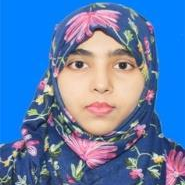
Fatematuj Johora
Work place: Khulna University of Engineering & Technology / Biomedical Engineering, Khulna, Bangladesh
E-mail: fatematujjohora8002@gmail.com
Website: https://orcid.org/0000-0003-2389-0598
Research Interests: Medical Image Computing, Intrusion Detection System, Computer systems and computational processes, Data Structures and Algorithms, Detection Theory
Biography
Fatematuj Johora obtained BSc in Biomedical Engineering from KUET, Bangladesh in 2020. Currently, she is continuing her MSc Engineering at the same department and. Her research interest is on Medical Imaging Systems and Automated Diseases Detection.
Author Articles
Breast Cancer Classification from Ultrasound Images using VGG16 Model based Transfer Learning
By A. B. M. Aowlad Hossain Jannatul Kamrun Nisha Fatematuj Johora
DOI: https://doi.org/10.5815/ijigsp.2023.01.02, Pub. Date: 8 Feb. 2023
Ultrasound based breast screening is gaining attention recently especially for dense breast. The technological advancement, cancer awareness, and cost-safety-availability benefits lead rapid rise of breast ultrasound market. The irregular shape, intensity variation, and additional blood vessels of malignant cancer are distinguishable in ultrasound images from the benign phase. However, classification of breast cancer using ultrasound images is a difficult process owing to speckle noise and complex textures of breast. In this paper, a breast cancer classification method is presented using VGG16 model based transfer learning approach. We have used median filter to despeckle the images. The layers for convolution process of the pretrained VGG16 model along with the maxpooling layers have been used as feature extractor and a proposed fully connected two layers deep neural network has been designed as classifier. Adam optimizer is used with learning rate of 0.001 and binary cross-entropy is chosen as the loss function for model optimization. Dropout of hidden layers is used to avoid overfitting. Breast Ultrasound images from two databases (total 897 images) have been combined to train, validate and test the performance and generalization strength of the classifier. Experimental results showed the training accuracy as 98.2% and testing accuracy as 91% for blind testing data with a reduced of computational complexity. Gradient class activation mapping (Grad-CAM) technique has been used to visualize and check the targeted regions localization effort at the final convolutional layer and found as noteworthy. The outcomes of this work might be useful for the clinical applications of breast cancer diagnosis.
[...] Read more.Other Articles
Subscribe to receive issue release notifications and newsletters from MECS Press journals